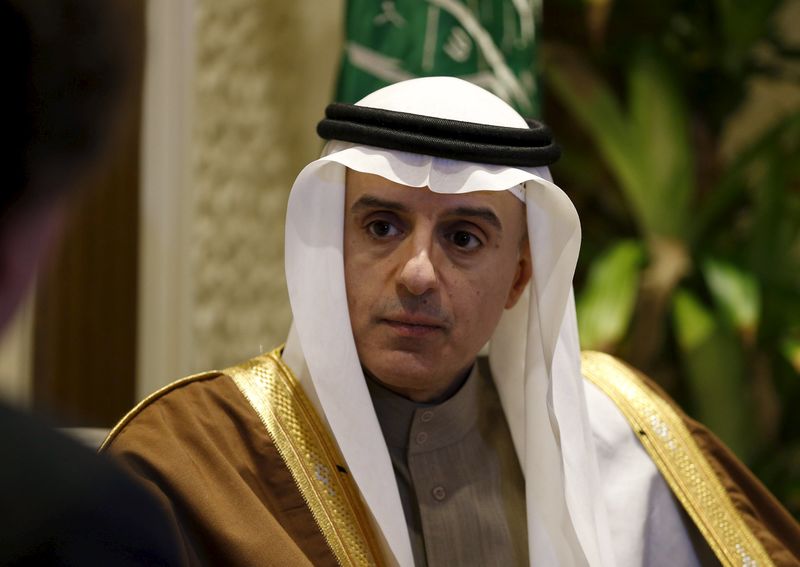By Angus McDowall
RIYADH (Reuters) - Saudi Arabia widened its rift with Iran on Monday, saying it would end air traffic and trade links with the Islamic republic and demanding that Tehran must "act like a normal country" before it would restore severed diplomatic relations.
Foreign Minister Adel al-Jubeir told Reuters in an interview that Tehran was responsible for rising tensions after the kingdom executed Shi'ite Muslim cleric Nimr al-Nimr on Saturday, describing him as a terrorist.
Insisting Riyadh would react to "Iranian aggression", he accused Tehran of dispatching fighters to Arab countries and plotting attacks inside the kingdom and its Gulf neighbors.
"There is no escalation on the part of Saudi Arabia. Our moves are all reactive. It is the Iranians who went into Lebanon. It is the Iranians who sent their Qods Force and their Revolutionary Guards into Syria," Jubeir said.
Tehran says it has sent only military advisers to Syria and Iraq at their governments' requests, and denies plots in Gulf states.
The execution of Nimr provoked protests among Shi'ites across the region and Iranian protesters stormed the Saudi embassy in Tehran, setting fires and causing damage, prompting Riyadh to cut ties and inflaming an already heated rivalry.
"We will also be cutting off all air traffic to and from Iran. We will be cutting off all commercial relations with Iran. And we will have a travel ban against people traveling to Iran," Jubeir said.
Iranian pilgrims would still be welcome to visit Islam's holiest sites in Mecca and Medina in western Saudi Arabia, either for the annual haj or at other times of year on the umrah pilgrimage, he said.
However, Jubeir said Saudi Arabia had been right to execute Nimr, whom he accused of "agitating, organizing cells, providing them with weapons and money" - allegations that the cleric's family have denied.
After listing the crimes of 43 al Qaeda members also put to death on Saturday alongside four Shi'ites, Jubeir said of the executions: "We should be applauded for this, not criticized."
'AGGRESSIVE POLICIES'
Jubeir, a former ambassador to Washington where the FBI in 2011 said he had been the target of an Iranian assassination plot, said the break in ties was a response to older problems as well as the embassy storming.
" (It) is a reaction to Iran's aggressive policies over the years, and in particular over the past few months. The Iranian regime has been a sponsor of terrorism, they have set up terrorist cells in Saudi Arabia and a number of other countries," he said.
Tehran has consistently denied those charges and itself has accused Riyadh of supporting militancy through its backing of Islamist rebels fighting Syrian President Bashar al-Assad.
Jubeir also accused Iran's authorities of complicity in the attack on the embassy at the weekend, saying Saudi diplomats had seen security forces enter the building and take part in looting and that the police did not respond to more than one request for help.
Iran has defended its measures to protect the Saudi embassy, saying it is investigating the matter and has made arrests.
Asked what steps Iran needed to take before Riyadh would consider restoring diplomatic ties, Jubeir said Tehran must "respect international norms and treaties and conventions" and "act like a normal country [that] respects the territorial integrity of its neighbors".
